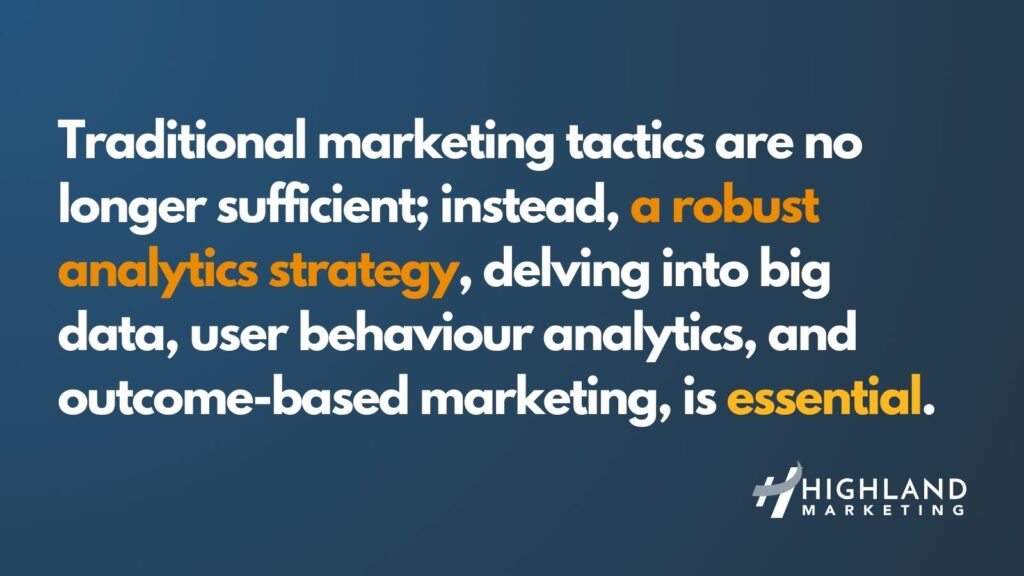This article explores the intricacies of marketing analytics and explains how this strategic edge can propel your business forward in the health technology industry.
The strategic edge of analytics-driven marketing in health tech
In a landscape where patient outcomes and service access directly correlate with financial health, leveraging analytics becomes imperative. Traditional marketing tactics are no longer sufficient; instead, a robust analytics strategy, delving into big data, audience behavior analytics, and outcome-based marketing, is essential. It’s about constructing narratives informed by data, where every user interaction serves as a learning opportunity. Sophisticated analytical tools dissect complex datasets, offering clarity and direction, enabling providers to tailor services and communications to meet evolving consumer expectations.
Defining and measuring success in health tech marketing
Success in healthcare tech marketing goes beyond simple metrics such as user engagement and brand loyalty; it encompasses a multifaceted evaluation that revolves around the measurement of return on investment (ROI). This metric serves as a compass, guiding health tech organisations towards understanding the effectiveness and efficiency of their marketing endeavors. ROI isn’t merely about tallying up numbers; it’s about dissecting layers of data, diving deep into user preferences, behaviours, and drivers. This intricate analysis empowers healthcare marketers to make informed decisions, ensuring that resources are allocated optimally to drive better patient outcomes while maximising brand value in the marketplace.
The journey towards defining and measuring success in healthcare marketing starts with a meticulous examination of various key performance indicators (KPIs). These indicators provide invaluable insights into the effectiveness of marketing campaigns. By scrutinising these KPIs, healthcare organisations gain a comprehensive understanding of the overall health of their marketing efforts. Moreover, this granular analysis enables them to identify areas of improvement, refine strategies, and reallocate resources strategically.
Harnessing data to drive user-centered marketing
The journey from online prospect to loyal client is paved with data. Every interaction, from the first click to post-treatment feedback, furnishes valuable insights. Health tech strategy setting serves as a compass, guiding providers through this intricate journey. By leveraging this data, marketers can create campaigns that resonate with their audience, fostering personalised connections. This tailored approach isn’t just about selling services; it’s about providing value and addressing individual health tech needs.
Leveraging analytics for strategic decision-making
Gone are the days of guesswork; the digital age equips marketers with tools for precision and predictability. From advanced CRM systems to predictive analytics, the toolkit available today is diverse and potent. These tools empower marketers to track campaign effectiveness, anticipate trends, and proactively plan for the future. By staying ahead of the curve, healthcare tech providers can ensure that their marketing efforts are not just effective, but also efficient, relevant, and user-centric.
Building trustworthy brands in health tech
Trust is the bedrock of successful marketing, particularly in healthcare. Users seek care, comfort, and reassurance, making trust paramount. Analytics aid in sculpting a brand image that reflects these values. By analysing audience feedback and social media engagement, providers gain insights into brand perception and avenues for improvement. This user-centric approach fosters higher engagement rates and deeper trust between user and providers.
The digital transformation of health tech marketing
The digital age has revolutionised marketing insights, with analytics platforms enabling real-time campaign tracking and dynamic strategy adjustments. This dynamic approach ensures messaging relevance and sustains audience engagement in an increasingly competitive market. Digital marketing transcends being just a channel; it’s a lifeline to user engagement and retention, ensuring continual brand relevance and resonance.

Analytics as the cornerstone of marketing ROI
Return on investment guides all marketing endeavors where user engagement and provider reputation are at stake. Analytics-driven ROI calculation requires a nuanced understanding of data analytics. By meticulously tracking acquisition costs, conversion rates, and patient lifetime value, marketers gain insights into campaign performance. This analytical approach enables granular examination of strategies, ensuring optimal resource utilisation and sustainable growth.
The symbiosis of marketing analytics and user experience
Beyond numbers and charts, healthcare marketing analytics drive tangible improvements in user experience. By analysing feedback, satisfaction scores, and engagement metrics, providers identify effective communication strategies. This feedback loop fosters continuous improvement in service delivery, enriching user experiences and driving better health outcomes.
Harnessing predictive analytics for future-proof marketing
Predictive analytics offer a glimpse into the future of user engagement and service demand. By analysing historical and current data trends, marketers forecast future behaviors and preferences, enabling proactive planning. This foresight empowers providers to develop strategies that anticipate needs, optimise resource allocation, and mitigate risks, ensuring sustained growth and resilience.
Personalisation at scale through marketing analytics
Personalisation is the hallmark of effective marketing, but maintaining it at scale is challenging. Marketing analytics bridge this gap, providing insights for mass personalisation. Through data segmentation and machine learning algorithms, marketers tailor messaging to resonate with broad audience groups while addressing individual needs. This personalised approach transforms marketing from broad outreach to targeted engagement, fostering long-term relationships and loyalty.
The ethical dimension of healthcare marketing analytics
Ethical use of health tech marketing analytics is crucial, given the sensitivity of user information. Marketers must navigate this balance, leveraging data for service improvement while respecting privacy and consent. Compliance with regulations such as GDPR and HIPAA is essential, but ethical marketing goes beyond, focusing on audience interests and trust-building.
Integrating marketing analytics into strategic planning
Marketing analytics integration into strategic planning is imperative for success. By analysing market trends, audience needs, and campaign effectiveness, providers make informed decisions aligned with organisational goals. This integration ensures that marketing isn’t a standalone endeavor but a pivotal part of broader strategies, driving user-centric service delivery.
The evolving role of AI in healthcare marketing analytics
AI is revolutionising healthcare marketing, offering unprecedented precision and insight. AI-driven analytics process vast data quantities, uncovering patterns and insights for effective strategies. This evolution signifies a leap towards data-driven healthcare, where AI tools not only predict trends but also prescribe actionable strategies that ensure continued growth and innovation.
Leveraging analytics for enhanced ROI with Highland Marketing
The pursuit of enhanced ROI in health tech marketing is a complex journey—one that requires not just data, but the right partner to translate that data into success. Highland Marketing offers sales acceleration services, brand-building expertise, and market analysis that stand at the intersection of innovative marketing strategies and measurable outcomes.
By engaging with Highland Marketing, healthcare tech providers can ensure that their journey into the depths of marketing analytics is both strategic and results-driven. For a partnership that transforms analytics into ROI and strategies into success stories, contact Highland Marketing. Your journey towards data-driven excellence in healthcare marketing begins here.


